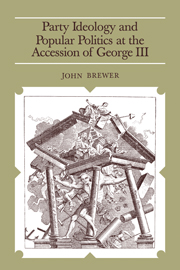Book contents
- Frontmatter
- Contents
- Preface
- A note to the reader
- PART I INTRODUCTION
- PART II THE RECONFIGURATION OF POLITICS
- 3 Whig and tory
- 4 Opposition and the proprietary parties
- 5 From Old Corps to Rockinghamite whigs: the emergence of a party
- 6 Pitt and patriotism: a case study in political argument
- 7 Ministerial responsibility and the powers of the Crown
- PART III AN ALTERNATIVE STRUCTURE OF POLITICS
- PART IV FOCUSSED RADICALISM
- PART V TWO POLITICAL NATIONS
- PART VI CONCLUSION
- Notes
- Bibliography
- Index
5 - From Old Corps to Rockinghamite whigs: the emergence of a party
Published online by Cambridge University Press: 15 December 2009
- Frontmatter
- Contents
- Preface
- A note to the reader
- PART I INTRODUCTION
- PART II THE RECONFIGURATION OF POLITICS
- 3 Whig and tory
- 4 Opposition and the proprietary parties
- 5 From Old Corps to Rockinghamite whigs: the emergence of a party
- 6 Pitt and patriotism: a case study in political argument
- 7 Ministerial responsibility and the powers of the Crown
- PART III AN ALTERNATIVE STRUCTURE OF POLITICS
- PART IV FOCUSSED RADICALISM
- PART V TWO POLITICAL NATIONS
- PART VI CONCLUSION
- Notes
- Bibliography
- Index
Summary
I will attend to measures not men, but wish to see those measures conducted by [the] Butes and Grenville connection, rather than by Rockinghams, etc. I have reason to think the former wishes to extirpate party distinctions, as I know the latter wants to establish ‘em. (Sir Armine Wodehouse to Lord Townshend, 9 August 1767. Norfolk RO Townshend Mss.)
Two closely related problems dominated the thinking of the Newcastle and Rockingham whigs after the political disasters of 1762. The first of these was the question of the fate of the whig party. Because the Rockinghams saw the battle between government and opposition as a struggle between tory and whig, it was not difficult for them to agree with others in opposition who urged that ttee whig party ought to be united against the threat of a (putative) new toryism. This, after all, was merely the application, in opposition, of a tried and well-worn tactic which the whig alliance had used when it had dominated officeholding. But, throughout the first decade of George III's reign, there was very considerable disagreement amongst those who selfconsciously opposed the ‘new toryism’, about both the ideological complexion of the whig party and the composition of its leadership. Tensions that had usually, though by no means invariably, remained covert before 1761 were now, in the adverse circumstance of opposition, made quite explicit.
- Type
- Chapter
- Information
- Publisher: Cambridge University PressPrint publication year: 1976



